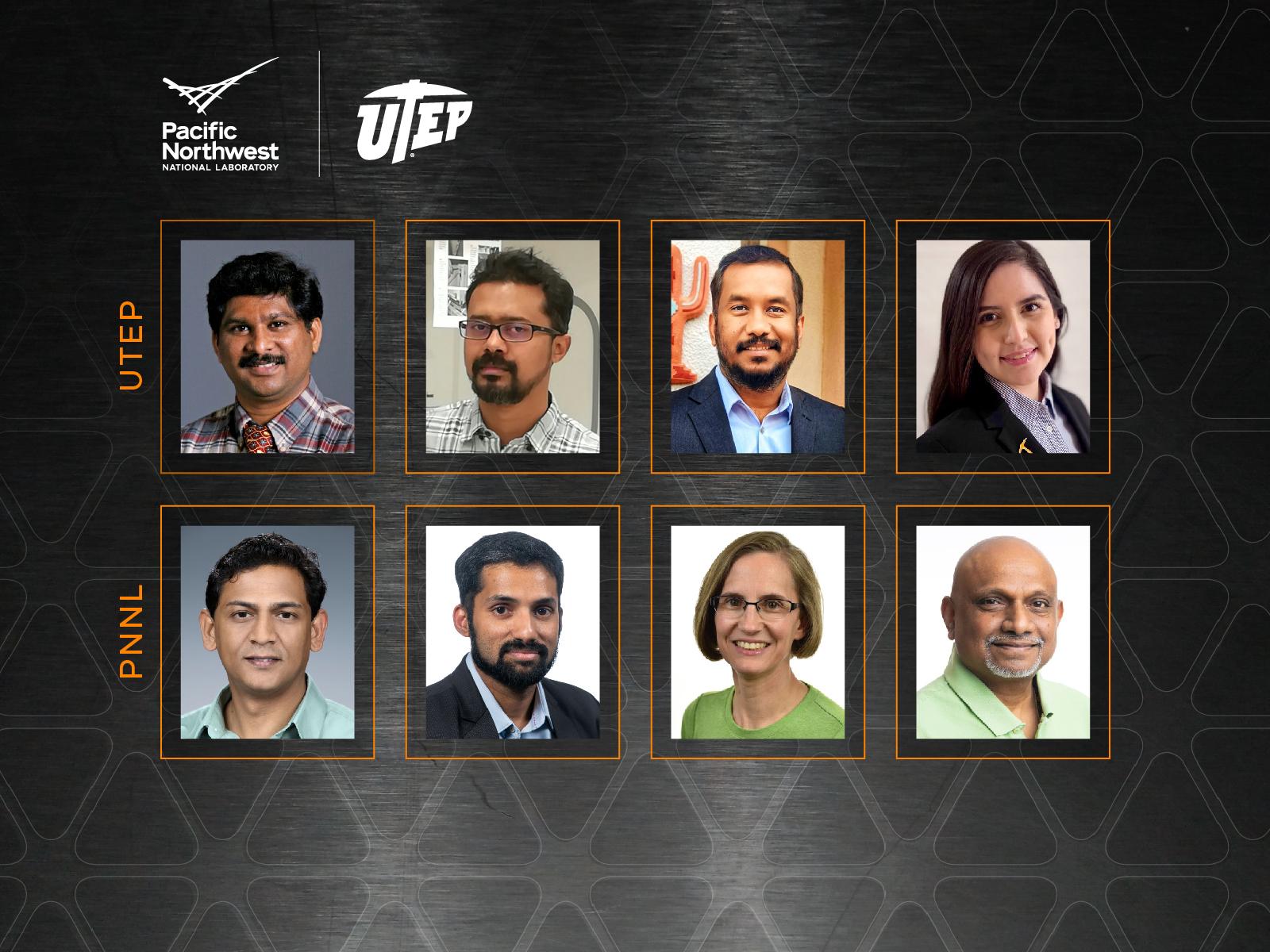Partnering to Decarbonize Material Manufacturing
Pacific Northwest National Laboratory and the University of Texas at El Paso leverage partnership and joint appointment program for a laboratory directed research and development project

Top row (left to right): Ramana Chintalapalle, Harikrishnan Nair, Sreeprasad Sreenivasan, Francelia Sanchez. Bottom row (left to right): Ajay Karakoti, Arun Devaraj, Tiffany Kaspar, Shutthanandan Vaithiyalingam.
(Photo composite by Melanie Hess-Robinson | Pacific Northwest National Laboratory)
Pacific Northwest National Laboratory (PNNL) and The University of Texas at El Paso (UTEP) are leveraging their long-standing partnership and joint appointment program to address the grand challenge of reducing carbon dioxide emissions from materials manufacturing.
“The partnership between PNNL and UTEP enables our faculty to work collaboratively with PNNL scientists in advancing the frontiers of knowledge and it connects our graduate students with outstanding research experiences, like working with renowned scientists and becoming trained with state-of-the art research facilities and equipment,” said UTEP Vice President for Research Ahmad Itani, Ph.D.
Engineered materials are part of our everyday life. Metals and alloys, such as aluminum and steel, are routinely used for building cars, airplanes, bridges, and other construction projects. However, all these materials are largely manufactured using conventional methods that produce more than 10 percent of global carbon dioxide (CO2) emissions, according to a recent study published in the Energy and Environmental Science Journal. Researchers understand that greener methods using renewable electricity or hydrogen-based reduction of metal ores can significantly reduce the amount of CO2 produced; however, the process is not sufficiently understood at the atomic scale for efficient large-scale implementation.
The Laboratory Directed Research and Development project is aimed at increasing knowledge about greener reduction processes to help accelerate and achieve CO2-free production of metals. PNNL Materials Scientist Ajay Karakoti and Professor Ramana Chintalapalle, PhD, who directs UTEP’s Center for Advanced Materials Research, maintain joint appointments at both institutions and co-lead the project. The team also includes PNNL Material Scientists Arun Devaraj, Tiffany Kaspar, and Shutthanandan Vaithiyalingam, and UTEP Assistant Professors Sreeprasad Sreenivasan, PhD, and Harikrishnan Nair, PhD.
“Understanding of these atomic-scale mechanisms is essential for us to be able to decarbonize material manufacturing while simultaneously achieving high efficiency for these processes,” said Devaraj.
In addition to climate impact, the team understands the educational implications of the project. “Traditional engineering courses at UTEP explain how steel is made. The lessons learned from this project could go directly into future course curriculum,” said Professor Chintalapalle.
Chintalapalle has actively worked with research teams at PNNL for more than a decade and trained over 10 graduate students from UTEP to conduct research with PNNL.
“It is exciting to work with colleagues at UTEP to meaningfully engage in creating holistic research and academic impact, while directly addressing Department of Energy goals for industrial decarbonization and a diversely trained future workforce,” said Karakoti.
UTEP materials science and engineering graduate student Francelia Sanchez has been selected to work on the project at PNNL as part of her dissertation, which focuses on multifunctional materials under extreme environments.
“We want to give the next generation, and especially people of color and minorities, the highest opportunities for growth,” said Professor Chintalapalle.
As Sanchez travels to PNNL over the next year, PNNL staff on the project team also plan to visit UTEP. Multiple visits, workshops, and collaborative research projects have strengthened the mutual partnership.
"Collaborations such as the ones between UTEP and PNNL provide opportunities to combine both institution's unique capabilities to advance our scientific knowledge and impact, and contribute to developing our nation's future STEM experts," said Eduardo Monarez, co-director of PNNL-UTEP partnerships.
Sanchez said, “I am grateful to be part of this collaboration. I look forward to learning from the professional scientists and expanding my knowledge using the advanced characterization techniques available at PNNL. It is very exciting to conduct top-notch research that will help to fight the climate crisis.”
Published: June 29, 2023